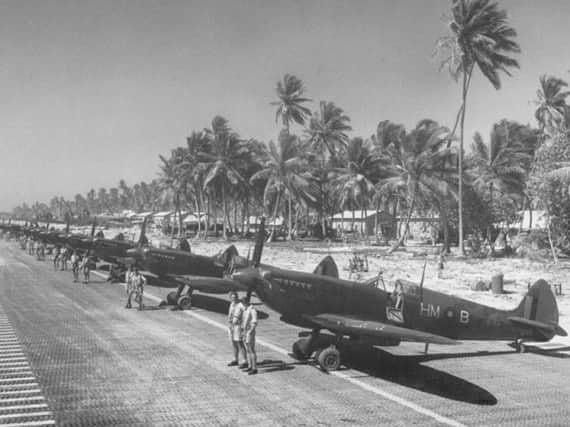70 years on and Jack is back in the Far East


In 1912 Jack’s father and other family members all decided to emigrate to North America in search of a new life. The family sought to cross the Atlantic together but there was not enough space to accommodate them all on the ship they wanted to travel on. So it was that some took a berth on one liner while others found places on another. Tragically, that other ship was the “RMS Titanic”. The White Star liner was on its maiden voyage and heading for a rendezvous with an iceberg in the North Atlantic. Unfortunately, Jack’s relations were among those that perished in the disaster.
The move to Canada didn’t work out as Jack’s father had hoped and after two years the family moved back to England and settled in High Hurstwood, a village on the southern fringe of the Ashdown Forest. It’s where Jack was born on 3rd July 1920 with the birth name of John.
Advertisement
Hide AdAdvertisement
Hide AdUpon the outbreak of World War II, Jack and his brother Jim volunteered for the Royal Engineers, enlisting in Brighton in January 1940. Jack was a concreter and Jim a bricklayer and the pair served together throughout the entire conflict. In March 1940 they joined the British Expeditionary Force in France.
When the Germans invaded the Low Countries and France in May, Jack’s unit was isolated from the main BEF as it retreated to Dunkirk. The engineers withdrew southwards. Jack remembers mining a bridge that was to be blown when the enemy approached. A vehicle was spotted and the plunger was pressed - to no effect. Which was very lucky as the vehicle turned out to be a stray British bren-gun carrier.
Later they blew up a much larger bridge and Jack saw the whole structure lift high into the air before settling in the water in a buckled “V” shape. On 10th June the brothers arrived in the port of Le Havre. As the Germans approached, the two were ordered to board what Jack recalls as a “bloody old tub”. Clouds of smoke from burning oil depots hid them from Luftwaffe bombers though they did witness a stricken French fighter plane crash into the sea nearby.
The pair made it safely to Southampton along with some 11,000 other Allied soldiers rescued by “Operation Cycle”, a successor to the much bigger evacuation at Dunkirk. Jack’s army paybook has an entry for June 1940: “Ex BEF 48 hours leave with free travel warrant.” A train took him to Tunbridge Wells from where he had to walk the dozen or so miles to High Hurstwood.
Advertisement
Hide AdAdvertisement
Hide AdJack remembers the white contrails of fighter aircraft in the Sussex skies as the Battle of Britain began. The brothers went to build air raid shelters in London. Later they were posted north and were in Halifax during a big bombing raid. While in Yorkshire Jack met Dorothy, a Leeds bus conductress. The two were married in June 1943.
Jack and Jim were told they would be going to Singapore but the move was cancelled after the Japanese occupied much of the Far East in early 1942. It was 1944 before they finally sailed for the Orient via Bombay. Their destination was the Cocos Islands, midway between Australia and Ceylon, a vital Allied communications base in the Indian Ocean. The Cocos were subject to occasional air attack from Japanese-held Java and Sumatra and once an enemy submarine surfaced off the islands and fired off a few shells from its deck gun.
In 1914 the waters around the Cocos had been the scene of a naval engagement between the German surface raider “Emden” and the Australian cruiser “HMAS Sydney”. The “Emden” was sunk. When Jack was on the Cocos he bought a souvenir knife fashioned by the islanders from scrap metal taken from the German ship. He still has the knife today.
When the war ended, the brothers came home. Jack’s demob notice describes him as a “hardworking and industrious NCO of exemplary conduct”. He was reunited with wife Dorothy and saw his 10-month old daughter, Sandy, for the very first time.
Advertisement
Hide AdAdvertisement
Hide AdI have known Jack for nearly half a century but it wasn’t until my wife Barbara and I visited him and Sandy and son-in-law Mick in their home in Krabi in 2009 that I learnt of his wartime experiences. Jack’s wife Dorothy died in 1991 and he later suffered a serious stroke. But when Sandy and Mick asked if he wanted to accompany them to Thailand and live with them in their retirement home, Jack leapt at the opportunity. This despite the fact that he had never left England for much more than one of his village pub’s day trips to France since coming home from the war. A dozen or so years later and though frail he is still enjoying life in Thailand.
I can’t complete this tale without mention of Jack’s son, Stuart. He still lives in Sussex. Soon after dawn one morning in 1973 he took me to a brook in High Hurstwood and demonstrated how he could “tickle” trout and catch them with his bare hands. As a “townee” my amazement knew no bounds.